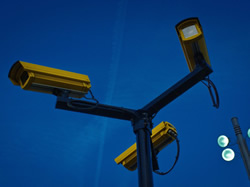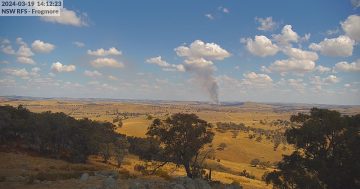Victoria Song* says in what’s been called a ‘dangerous and sinister step’, London Police have started using live facial recognition technology.
 The dystopian nightmare begins.
The dystopian nightmare begins.
On 25 January, London’s Metropolitan Police Service announced it will begin deploying Live Facial Recognition (LFR) tech across the British capital in the hopes of locating and arresting wanted people.
“We are using a tried-and-tested technology, and have taken a considered and transparent approach in order to arrive at this point,” Assistant Commissioner, Nick Ephgrave said in a statement.
“Similar technology is already widely used across the UK, in the private sector.”
“Ours has been trialled by our technology teams for use in an operational policing environment.”
The way the system is supposed to work, according to the Metropolitan Police, is the LFR cameras will first be installed in areas where “intelligence” suggests the Agency is most likely to locate “serious offenders”.
Each deployment will supposedly have a “bespoke” watch list comprising images of wanted suspects for serious and violent offences.
The London Police also note the cameras will focus on small, targeted areas to scan folks passing by.
According to BBC News, previous trials had taken place in areas such as Stratford’s Westfield shopping mall and the West End area of London.
It seems likely the Agency is also anticipating some unease, as the cameras will be “clearly signposted” and officers are slated to hand out informational leaflets.
The Agency’s statement also emphasises that the facial recognition tech is not meant to replace policing — just “prompt” officers by suggesting a person in the area may be a fishy individual … based solely on their face.
“It is always the decision of an officer whether or not to engage with someone,” the statement reads.
On Twitter, the Agency also noted in a short video that images that don’t trigger alerts will be immediately deleted.
As with any police-related, Minority Report-esque tech, accuracy is a major concern.
While the Metropolitan Police Service claims that 70 per cent of suspects were successfully identified and that only one in 1,000 people created a fake alert, not everyone agrees the LFR tech is rock-solid.
An independent review from July 2019 found that in six of the trial deployments, only eight of 42 matches were correct for an abysmal 19 per cent accuracy.
Other problems found by the review included inaccurate watch list information (e.g., people were stopped for cases that had already been resolved), and the criteria for people being included on the watch list weren’t clearly defined.
Privacy groups aren’t particularly happy with the development.
Big Brother Watch, a privacy campaign group that’s been particularly vocal against facial recognition tech, took to Twitter, telling the Metropolitan Police Service they’d “see them in court”.
“This decision represents an enormous expansion of the surveillance state and a serious threat to civil liberties in the UK,” said Silkie Carlo, Big Brother Watch’s Director, in a statement.
“This is a breathtaking assault on our rights and we will challenge it, including by urgently considering next steps in our ongoing legal claim against the Met and the Home Secretary.”
Meanwhile, another privacy group, Liberty, has also voiced resistance to the measure.
The group tweeted: “Rejected by democracies. Embraced by oppressive regimes. Rolling out facial recognition surveillance tech is a dangerous and sinister step in giving the State unprecedented power to track and monitor any one of us. No thanks.”
The London Police’s decision comes at an interesting time.
Earlier this month, the European Union began mulling a three-to-five-year ban on facial recognition tech in public areas.
It’s unclear whether that ban will ever come to pass — the news came via a leaked version of an early draft of a European Commission white paper.
It’s also not clear if it will ultimately matter, given the looming spectre of Brexit.
That said, Liberty has already garnered over 22,000 signatures for a petition demanding Britain’s Home Secretary ban the use of facial recognition tech in public places.
* Victoria Song writes for Gizmodo. She tweets at @vicmsong.
This article first appeared at www.gizmodo.com.au.



